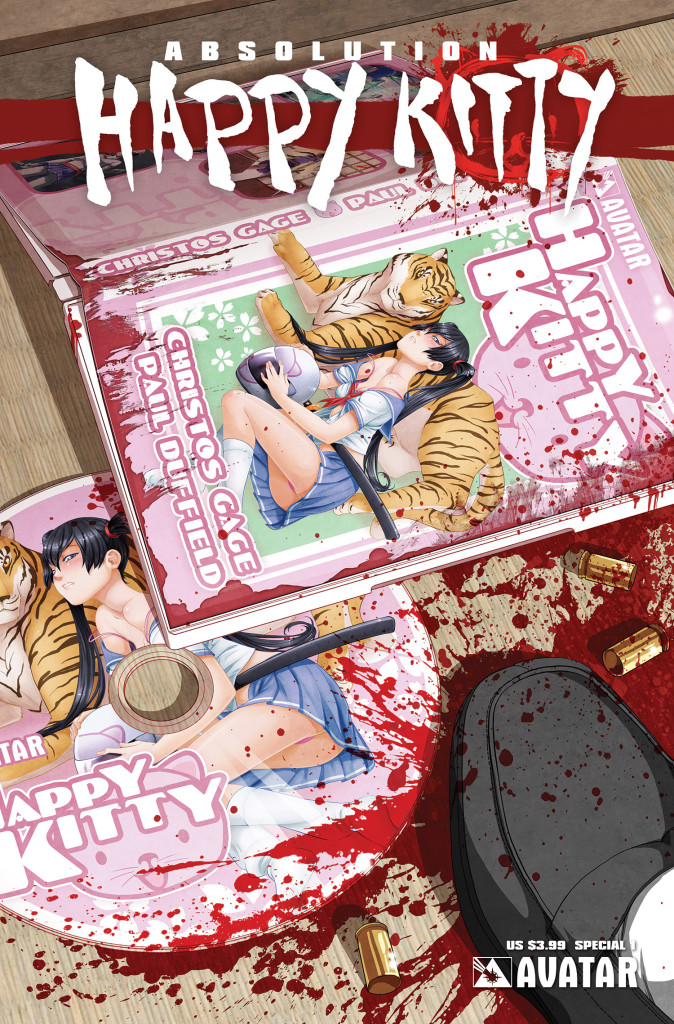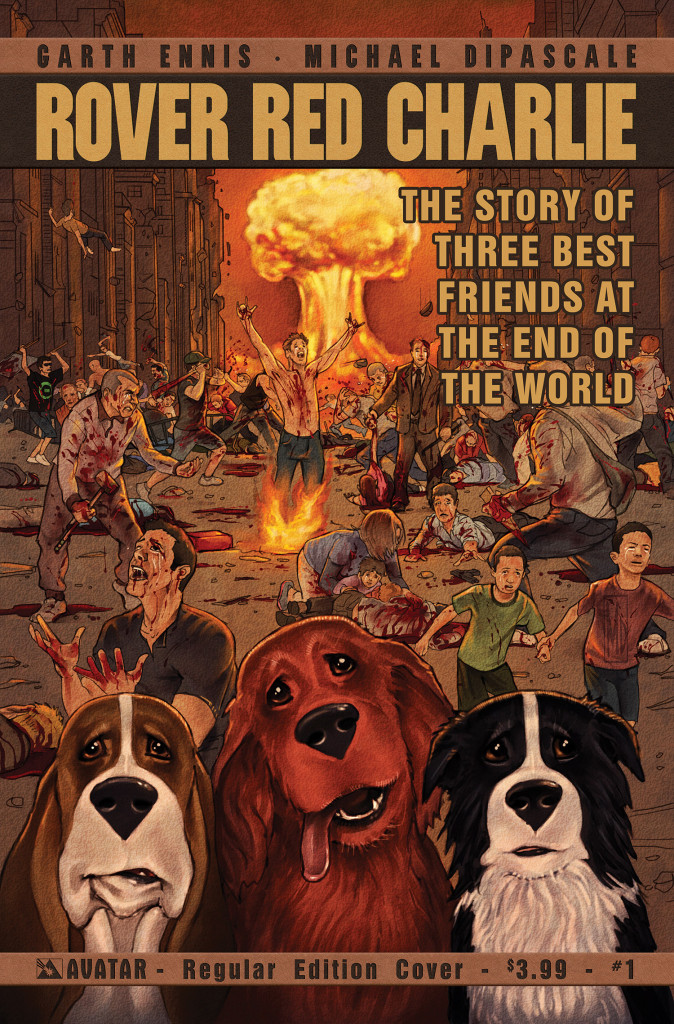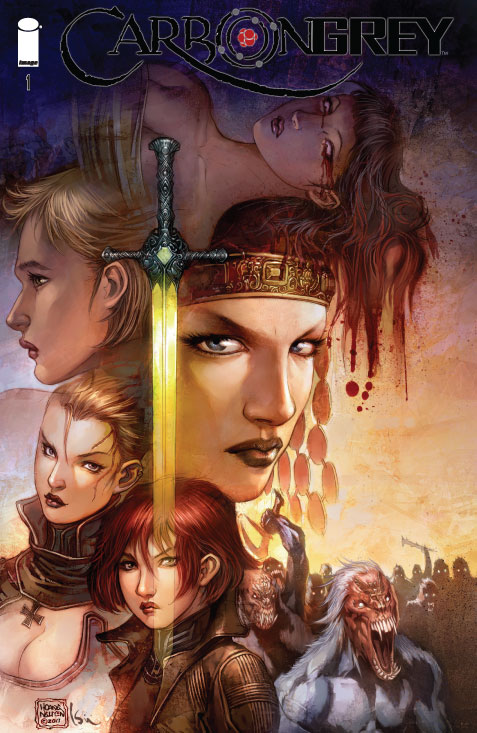We’re No. 1! is a weekly feature looking at first issues in new comic series, as well as one-offs and special releases. In his reviews, Jeff highlights stories with diverse characters and plot lines Geekquality readers can care about, as well as points out comics that miss the mark.
Although it was a lighter we ek, there were a couple of real gems in the mix in new comics. The first was a book I was prepared to dislike but ended up not being able to get out of mind. If the title of Absolution: Happy Kitty Special #1 throws you, don’t worry. This is essentially an origin story of the popular character from Christos Gage’s Absolution series, and Happy Kitty seemed a bit of an overused stereotype when I first encountered her. An Asian woman in a school girl/sailor suit with a sword and a gun, killing bad guys? This has been done to death in manga and comics, and feels fetishized nearly every time. This time around Gage and artist Paul Duffield tell the story of a young girl who’s been exploited, and there’s a big difference between exploitative tropes and a narrative of a troubled character. Happy Kitty was a child when her parents were murdered by the Yakuza right in front of her. The head gangster recognized something in the small child, who refused to stop playing Duck Hunt while her parent’s throats were slit. Not only did she seem to lack empathy, she had the gift of precognition as well, giving her superhumanly fast reflexes. Taken in by the Yakuza, Happy Kitty was raised on a diet of violent video games and a lack of human connection, finally bonding only with a large tiger. It’s this one emotional connection that finally pushes her to break the bonds of her captivity, but she may be so broken that she’ll have have a hard time forming bonds with people in the future. Happy Kitty speaks to the concept of the “strong female character” in a powerful way. She is certainly a powerful and capable woman, but she’s not a role model – she’s a fully developed character. A victim for certain, her instability creates a certain sadness for the reader, while her stereotypical look speaks to the troubles of her past. Happy Kitty isn’t not just a fetish to be enjoyed on the surface but a parable for the kind of treatment of women that creates such stereotypes in the first place. Gage pulls no punches in this book, a violent but ultimately sad and well realized story.
ek, there were a couple of real gems in the mix in new comics. The first was a book I was prepared to dislike but ended up not being able to get out of mind. If the title of Absolution: Happy Kitty Special #1 throws you, don’t worry. This is essentially an origin story of the popular character from Christos Gage’s Absolution series, and Happy Kitty seemed a bit of an overused stereotype when I first encountered her. An Asian woman in a school girl/sailor suit with a sword and a gun, killing bad guys? This has been done to death in manga and comics, and feels fetishized nearly every time. This time around Gage and artist Paul Duffield tell the story of a young girl who’s been exploited, and there’s a big difference between exploitative tropes and a narrative of a troubled character. Happy Kitty was a child when her parents were murdered by the Yakuza right in front of her. The head gangster recognized something in the small child, who refused to stop playing Duck Hunt while her parent’s throats were slit. Not only did she seem to lack empathy, she had the gift of precognition as well, giving her superhumanly fast reflexes. Taken in by the Yakuza, Happy Kitty was raised on a diet of violent video games and a lack of human connection, finally bonding only with a large tiger. It’s this one emotional connection that finally pushes her to break the bonds of her captivity, but she may be so broken that she’ll have have a hard time forming bonds with people in the future. Happy Kitty speaks to the concept of the “strong female character” in a powerful way. She is certainly a powerful and capable woman, but she’s not a role model – she’s a fully developed character. A victim for certain, her instability creates a certain sadness for the reader, while her stereotypical look speaks to the troubles of her past. Happy Kitty isn’t not just a fetish to be enjoyed on the surface but a parable for the kind of treatment of women that creates such stereotypes in the first place. Gage pulls no punches in this book, a violent but ultimately sad and well realized story.
 There is also a sense of childlike sadness in Rover Red Charlie #1 from Warren Ellis and Michael Dipascale. Avatar are known for horror, bloodshed, and great End of the World comics, but this one is as unique a take on the genre as you’ll find. It’s the story of three dogs, Rover, Red and narrator Charlie, as they experience the first horrific stages of a societal apocalypse. The tale is told completely from the dogs’ point of view, and the innocence of the animals plays masterfully against the horror of what’s happening around them, as humanity – the dogs refer to them as “the feeders” – goes indiscriminately unhinged. Charlie is a border collie and a proud service dog. Red is an Irish setter who isn’t the most clever, and Charlie is a Basset hound from England. The dogs speak to each other as people would converse, but their interactions with humans are translated brilliantly into the simplified ways we communicate with out pets. Charlie and Red’s continual shouting of “I’m a dog! I’m a dog! I’m a dog! I’m a dog!” are immediately familiar to anyone who’s heard a dog announce himself to protect his space or his “feeder”. The dog’s faith that “feeders don’t hurt dogs” is innocent, but sad in its falsehood. Even the dogs know it’s not true, and admit it in whispered stories of dogs who’ve been “rescued.” They even recognize that some dogs turn out badly because their feeders weren’t kind to them, and all three characters exhibit a mindset that dog owners and dog lovers will immediately recognize. The sadness and dismay at the chaos around them, as “feeders” mindlessly murder each other and harm themselves, creates a horror that’s original in this overplayed genre. Such a unique take cannot be ignored, but be warned if you are a dog lover, as some of the scenes are quite graphic and heartbreaking.
There is also a sense of childlike sadness in Rover Red Charlie #1 from Warren Ellis and Michael Dipascale. Avatar are known for horror, bloodshed, and great End of the World comics, but this one is as unique a take on the genre as you’ll find. It’s the story of three dogs, Rover, Red and narrator Charlie, as they experience the first horrific stages of a societal apocalypse. The tale is told completely from the dogs’ point of view, and the innocence of the animals plays masterfully against the horror of what’s happening around them, as humanity – the dogs refer to them as “the feeders” – goes indiscriminately unhinged. Charlie is a border collie and a proud service dog. Red is an Irish setter who isn’t the most clever, and Charlie is a Basset hound from England. The dogs speak to each other as people would converse, but their interactions with humans are translated brilliantly into the simplified ways we communicate with out pets. Charlie and Red’s continual shouting of “I’m a dog! I’m a dog! I’m a dog! I’m a dog!” are immediately familiar to anyone who’s heard a dog announce himself to protect his space or his “feeder”. The dog’s faith that “feeders don’t hurt dogs” is innocent, but sad in its falsehood. Even the dogs know it’s not true, and admit it in whispered stories of dogs who’ve been “rescued.” They even recognize that some dogs turn out badly because their feeders weren’t kind to them, and all three characters exhibit a mindset that dog owners and dog lovers will immediately recognize. The sadness and dismay at the chaos around them, as “feeders” mindlessly murder each other and harm themselves, creates a horror that’s original in this overplayed genre. Such a unique take cannot be ignored, but be warned if you are a dog lover, as some of the scenes are quite graphic and heartbreaking.

There was a smattering of other #1’s this week, though none of such high quality. The Cape comics set will want to get a hold of Inhumanity #1, the latest Marvel mega cross-over event that will “shake up” and/or “tear apart” the Marvel Universe. It’s penned by hotshot writer Matt Fraction (Sex Criminals, Hawkeye) and does offer a nice lighthearted cameo of Hawkeye being a full-on superhero while still maintaining Fraction’s every-slacker take on the character. Meanwhile, Image comics brings us Carbon Gray Vol. 3, #1 which of course isn’t a #1 at all but just the first issue in the final chapter of this female driven, steampunk World War fantasy epic. It’s highly convoluted plot wise (thankfully there’s a great primer on page 1) but it is absolutely beautiful to look at. Hoang Nguyen paints the Carbon Grey series in such stunning strokes that it’s impossible to ignore. It’s also great to see that women are both the heroes and the villain in this series, rather than constantly showing women being victimized or opposed by men. It’s a fantastically original story, though I’d strongly recommend some back issue reading on this one.

